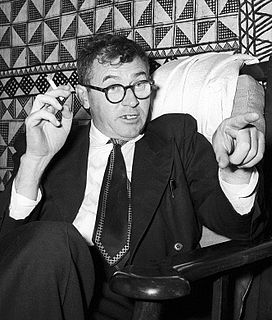A Quote by Carl Jung
The unconscious is not a demoniacal monster, but a natural entity which, as far as moral sense, aesthetic taste, and intellectual judgment go, is completely neutral.It only becomes dangerous when our conscious attitude to it is hopelessly wrong. To the degree that we repress it, its danger increases.
Related Quotes
A good taste in art feels the presence or the absence of merit; a just taste discriminates the degree--the poco piu and the poco meno. A good taste rejects faults; a just taste selects excellences. A good taste is often unconscious; a just taste is always conscious. A good taste may be lowered or spoilt; a just taste can only go on refining more and more.
Weakness of attitude becomes weakness of character; it becomes lack of power to act with courage proportionate to danger. All this must lead to the destruction of our intellectual life unless the danger summons up strong personalities able to fill the lukewarm and discouraged with new strength and resolution.
Of all the intellectual faculties, judgment is the last to mature. A child under the age of fifteen should confine its attention either to subjects like mathematics, in which errors of judgment are impossible, or to subjects in which they are not very dangerous, like languages, natural science, history, etc.
Diaries tell their little tales with a directness, a candor, conscious or unconscious, a closeness of outlook, which gratifies our sense of security. Reading them is like gazing through a small clear pane of glass. We may not see far and wide, but we see very distinctly that which comes within our field of vision.
Of all the things we are wrong about, error might well top the list ... We are wrong about what it means to be wrong. Far from being a sign of intellectual inferiority, the capacity to err is crucial to human cognition. Far from being a moral flaw, it is inextricable from some of our most humane and honourable qualities: empathy, optimism, imagination, conviction, and courage. And far from being a mark of indifference or intolerance, wrongness is a vital part of how we learn and change. Thanks to error, we can revise our understanding of ourselves and amend our ideas about the world.
Words of divine consciousness: moral exaltation; lasting feelings of elevation, elation, joy; a quickening of the moral sense, which strikes one as more important than an intellectual understanding of things; an alignment of the universe along moral lines, not intellectual ones; a realization that the founding principle of existence is what we call love, which works itself out sometimes not clearly, not cleanly, not immediately, nonetheless ineluctably.
We sometimes emphasize the danger in a crisis without focusing on the opportunities that are there. We should feel a great sense of urgency because it is the most dangerous crisis we have ever faced, by far. But it also provides us with opportunities to do a lot of things we ought to be doing for other reasons anyway. And to solve this crisis we can develop a shared sense of moral purpose.
It seems to us that in intelligence there is a fundamental faculty, the alteration or the lack of which, is of the utmost importance for practical life. This faculty is judgment, otherwise called good sense, practical sense, initiative, the faculty of adapting one's self to circumstances. A person may be a moron or an imbecile if he is lacking in judgment; but with good judgment he can never be either. Indeed the rest of the intellectual faculties seem of little importance in comparison with judgment.
The truth is that it is our attitude towards children that is right, and our attitude towards grown-up people that is wrong. Our attitude towards our equals in age consists in a servile solemnity, overlying a considerable degree of indifference or disdain. Our attitude towards children consists in a condescending indulgence, overlying an unfathomable respect.
Of one thing we can be sure: our own future is inseparable from the larger community that brought us into being and which sustains us in every expression of our human quality of life, in our aesthetic and emotional sensitivities, our intellectual perceptions, our sense of the divine, as well as in our physical nourishment and bodily healing.
The essential fault of surrealism is that it invents without discovering. To make a clam play an accordion is to invent not to discover. The observation of the unconscious, so far as it can be observed, should reveal things of which we have previously been unconscious, not the familiar things of which we have been conscious plus imagination.




































